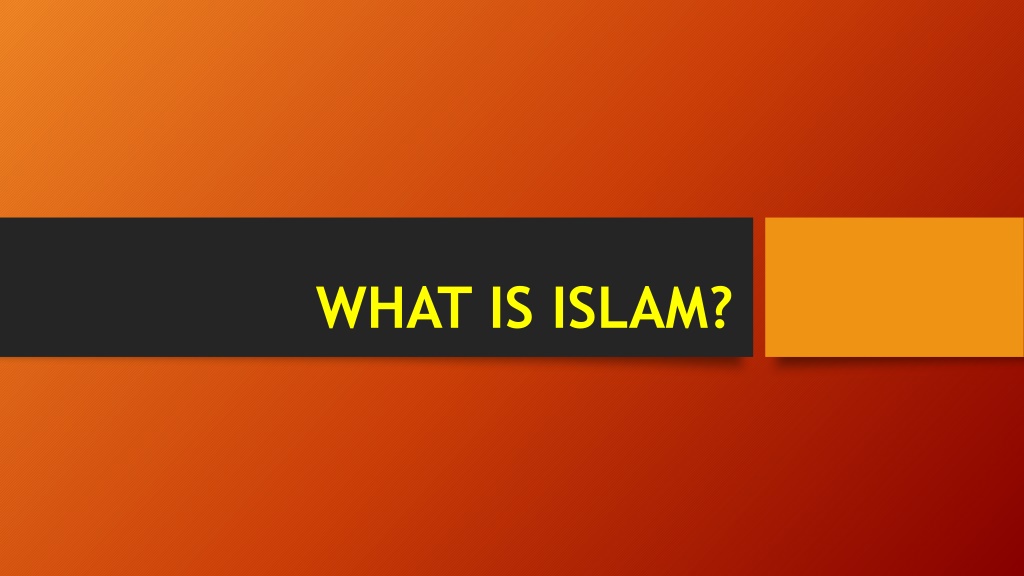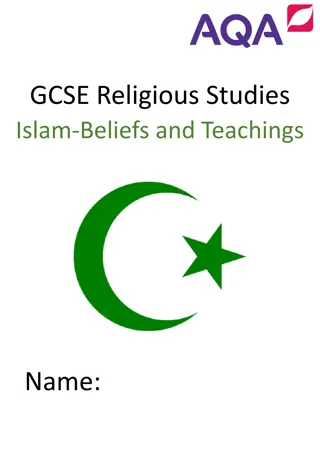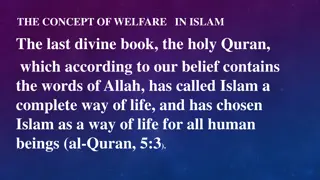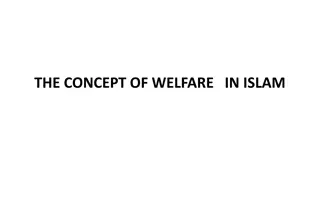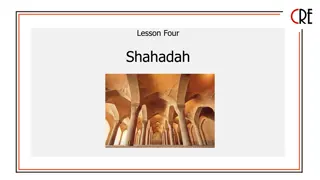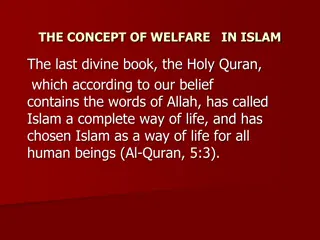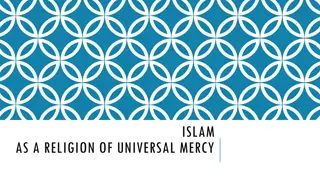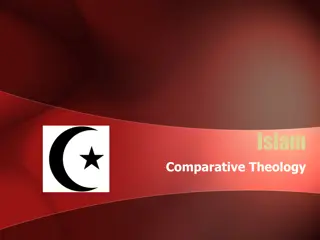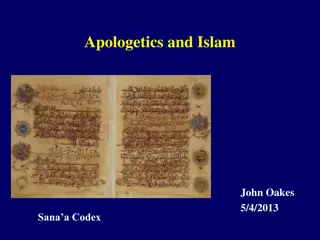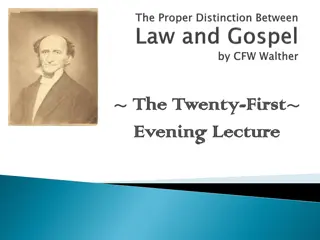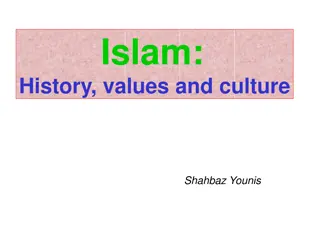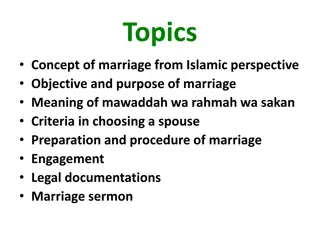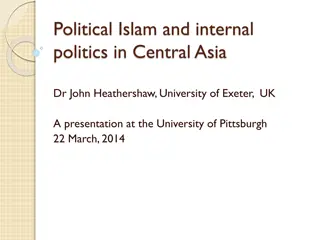Understanding Islam: A Brief Insight into the Faith
Islam, the second largest religion globally, was founded by Muhammad. It is monotheistic, believing in the Quran as the final revelation. Muslims see Ishmael as the line of promise from God. Central to Islam is submission to Allah and adherence to Sharia Law.
Download Presentation

Please find below an Image/Link to download the presentation.
The content on the website is provided AS IS for your information and personal use only. It may not be sold, licensed, or shared on other websites without obtaining consent from the author. Download presentation by click this link. If you encounter any issues during the download, it is possible that the publisher has removed the file from their server.
E N D
Presentation Transcript
Table of Contents Dimmi Taqiyya Hudaibiya Add It All Together Muslims are not the problem. Muslims want peace Peace according to Islam Websites Five Pillars (Alms) Five Pillars (Fasting) Five Pillars (Haj) Sharia Law Threat to Democracy (1) Threat to Democracy (2) Threat to Democracy (3) Abrogation What Is Islam? Definitions (1) Definitions (2) Definitions (3) Definitions (4) Five Pillars Five Pillars (Faith) Five Pillars (Prayer)
What is Islam? Islam is the second largest religion in the world. Islam was founded by the man Muhammad. Muslims consider him to be the last and greatest prophet of God. Islam is the fastest growing religion in the world. Islam is absolutely monotheistic in belief. Muslims believe the Old and New Testaments are God s Word. Muslims believe the Quran is God s final revelation to man and therefore supercedes the Bible. Muslims believe that since Ishmael was Abraham s firstborn son he, and not Isaac, is the son of promise, and God s covenant is with the children of Ishmael and not Isaac. Islam is driven by a conviction in the unity of God, obedience to the Quran and that Sharia Law should govern all the nations of the world.
Definitions Islam: Submission Muslim: One who submits Allah: God, but not in the English sense. One Muslim writer defined it thus: the unique God Who possesses all the attributes of perfection and beauty in their infinitude. Muhammad: the one who is praised. Founder of Islam. Born in Mecca in 570 a.d. He claimed he was the prophet sent by God to restore true religion.
Definitions Quran: (also spelled Koran), word means the recitation. This is the collection of revelations supposedly given by Allah through his archangel to Muhammad. It is the Islamic scripture. Muslims believe in the Law of Moses, the Psalms of David, and the Injil, or gospel of Jesus Christ. Sura: refers to the divisions within the Quran. They are equal to chapters in the Bible. The Quran contains 114 revelations, or suras. They are not chronological, but are compiled from shortest to longest. Hadith: Collected traditions. These are the supposed words of Muhammad and are the customs that provide source material for the intricate political and social structure of Islam.
Definitions Caliph: Deputy. The main leaders of Islam, especially the immediate successors to Muhammad. Ayatollah: Spiritual masters or leaders of Shi ite Islam. Sunni Islam: Largest group of Muslims. They accept the first four caliphs in direct succession from Muhammad and no others. Sunnis practice a moderate form of Islamic literary interpretation. 90% of Muslims in the Middle East are Sunnis. The Imam is simply a leader of a congregation.
Definitions Shi ite Islam: Interpret Quran very literally. Much more militant. 95% of Muslims in Iran are Shi ite. Today Iran is a Shi ite republic. For the Shi ite, there are only twelve imams. They all lived before 878 a.d. The twelfth and final imam was named Muhammad. He disappeared as a child. One day he will miraculously return. He will bring for the golden age of Islam before the end of the world. Gihad: Holy war. an Arabic word which literally means striving or struggling, especially with a praiseworthy aim. The word jihad appears frequently in the Quran with and without military connotations. To associate Gihad with warfare is to imply that warfare itself (Any military endeavor that promotes, or expands Islam) is a struggle that is praiseworthy and honoring to God.
The Five Pillars of Islam Iman or Faith Salah or Prayer Zakah or Financial obligation Sawm or Fasting Hajj or Pilgrimage
The Five Pillars of Islam Iman or Faith "There is none worthy of worship except God and Muhammad is the messenger of God." This declaration of faith is called the Shahadah, a simple formula that all the faithful pronounce. The significance of this declaration is the belief that the only purpose of life is to serve and obey God, and this is achieved through the teachings and practices of the Last Prophet, Muhammad.
The Five Pillars of Islam Salah or Prayer Salah is the name for the obligatory prayers that are performed five times a day, and are a direct link between the worshipper and God. There is no hierarchical authority in Islam and there are no priests. Prayers are led by a learned person who knows the Qur'an and is generally chosen by the congregation. Prayers are said at dawn, mid-day, late-afternoon, sunset and nightfall, and thus determine the rhythm of the entire day. These five prescribed prayers contain verses from the Qur'an, and are said in Arabic, the language of the Revelation. Personal supplications, however, can be offered in one's own language and at any time. Although it is preferable to worship together in a mosque, a Muslim may pray almost anywhere, such as in fields, offices, factories and universities. Oftentimes visitors to the Muslim world are struck by the centrality of prayers in daily life.
The Five Pillars of Islam Zakah The financial obligation upon Muslims. An important principle of Islam is that everything belongs to God, and that wealth is therefore held by human beings in trust. The word zakah means both "purification" and "growth." Our possessions are purified by setting aside a proportion for those in need and for the society in general. Like the pruning of plants, this cutting back balances and encourages new growth. Each Muslim calculates his or her own zakah individually. This involves the annual payment of a fortieth of one's capital, excluding such items as primary residence, car and professional tools.
The Five Pillars of Islam Sawm or Fasting Every year in the month of Ramada-n, all Muslims fast from dawn until sundown--abstaining from food, drink, and sexual relations with their spouses. Those who are sick, elderly, or on a journey, and women who are menstruating, pregnant or nursing, are permitted to break the fast and make up an equal number of days later in the year if they are healthy and able. Children begin to fast (and to observe prayers) from puberty, although many start earlier. Although fasting is beneficial to health, it is mainly a method of self-purification and self-restraint. By cutting oneself from worldly comforts, even for a short time, a fasting person focuses on his or her purpose in life by constantly being aware of the presence of God. God states in the Qur'an: "O you who believe! Fasting is prescribed for you as it was prescribed to those before you that you may learn self-restraint."
The Five Pillars of Islam Hajj or Pilgrimage The pilgrimage to Makkah (the hajj) is an obligation only for those who are physically and financially able to do so. Nevertheless, over two million people go to Makkah each year from every corner of the globe providing a unique opportunity for those of different nations to meet one another. The annual hajj begins in the twelfth month of the Islamic year (which is lunar, not solar, so that hajj and Ramada-n fall sometimes in summer, sometimes in winter). Pilgrims wear special clothes: simple garments that strip away distinctions of class and culture, so that all stand equal before God. The rites of the hajj, which are of Abrahamic origin, include going around the Ka'bah seven times, and going seven times between the hills of Safa and Marwa as did Hagar (Hajir, Abraham's wife) during her search for water. The pilgrims later stand together on the wide plains of 'Arafat (a large expanse of desert outside Makkah) and join in prayer for God's forgiveness, in what is often thought as a preview of the Day of Judgment. The close of the hajj is marked by a festival, the 'Id al Adha, which is celebrated with prayers and the exchange of gifts in Muslim communities everywhere. This and the 'Id al Fitr, a festive day celebrating the end of Ramada-n, are the two holidays of the Islamic calendar.
Its all about Sharia Law! Sharia is a body of law derived from the Qur'an, the hadiths of the Sunna (teachings of Muhammad) and fatwas (religious rulings). Intepretation of Sharia varies across countries, cultures and Islamic schools of thought. In Arabic, the term shar ah refers to God's immutable divine law. Christians are taught that the Bible commands you to submit to government authority as long as that authority does not violate God s Word. Muslims are taught that all governments must submit to Sharia law. Therefore, all Muslims are to submit to Sharia law.
Is Sharia Law a threat to democracy? In any broad sense, Islamic law offers the American lawyer a study in dramatic contrasts. Even casual acquaintance and superficial knowledge all that most of us at bench or bar will be able to acquire reveal that its striking features relative to our law are not likenesses but inconsistencies, not similarities but contrarieties. In its source, its scope and its sanctions, the law of the Middle East is the antithesis of Western law. This quote was by Robert Jackson, a giant figure in American law and politics FDR s attorney general, justice of the Supreme Court, and chief prosecutor of the war crimes trials at Nuremberg. In 1955, Justice Jackson penned the foreword to a book called Law in the Middle East.
Is Sharia Law a threat to democracy? How dreadful are the curses which Mohammedanism lays on its votaries! Besides the fanatical frenzy, which is as dangerous in a man as hydrophobia in a dog, there is this fearful fatalistic apathy, Improvident habits, slovenly systems of agriculture, sluggish methods of commerce, and insecurity of property exist wherever the followers of the Prophet rule or live. A degraded sensualism deprives this life of its grace and refinement; the next of its dignity and sanctity. The fact that in Mohammedan law every woman must belong to some man as his absolute property either as a child, a wife, or a concubine must delay the final extinction of slavery until the faith of Islam has ceased to be a great power among men. Winston Churchill
Is Sharia Law a threat to democracy? Sharia rejects freedom of speech as much as freedom of religion. It rejects the idea of equal rights between men and women as much as between Muslim and non-Muslim. It brooks no separation between spiritual life and civil society. It is a comprehensive framework for human life, dictating matters of government, economy, and combat, along with personal behavior such as contact between the sexes and personal hygiene. Sharia aims to rule both believers and non-believers, and it affirmatively sanctions jihad in order to do so. Written by Andre McCarthy; Assistant U.S. Attorney in the Southern District of New York, and from 1993-95 he led the terrorism prosecution against Sheik Omar Abdel Rahman and 11 others in connection with the 1993 World Trade Center bombing and a plot to bomb New York City landmarks.
The policy of deception, Abrogation Abrogation: Older Sunnis are replaced by newer ones Note: God can at any time abrogate one revelation, then the only revelation that is valid is his last one. This is not the same as fulfilling revelation. To fulfill is to complete. To abrogate is to remove one and replace it with another. With this in mind. One must read the Quran chronologically and not the way it is published. Then, one must start from the back and read to the front.
The policy of deception, Dimmi Second class citizens. People of other religions such as Christians and Jews who live in Islamic countries. Usually, they are allowed to maintain their faith, but they do not have equal status or rights as the muslims. This is practiced today in every Islamic country in the word. Neither Christians nor Jews are allowed to pray publicly. They cannot proselytize. They cannot ring church bells or pray in public. They cannot build new buildings, nor start new churches or synagogues. The yellow star of David that Jews wore in German concentration camps was developed in Iraq in the 9th century when Jews were forced to wear them for identification.
The policy of deception, Taqiyya The virtue of lying in order to promote Islam. A Muslim can put his hand on the Quran and lie with impunity and Alla will forgive him if his lie will further the cause of Islam and Sharia law.
The policy of deception, Hudaibiya The treaty of Hudaibiya: An Islamic principle of war and how to deceive your enemy when they are stronger than you and you are forced to sign a peace treaty. Once Muhammad attacked a Meccan Caravan near the city of Hudaibiya. His forces were stopped and he realized he was too weak to fight with Mecca. So, he signed a ten year peace treaty with Mecca. For two years he built his army. When it was large enough he broke the treaty and attacked Mecca without warning. This became a standard principle of warfare.
The policy of deception, Hudaibiya In 1993 Yassir Arafat met with the Israelis and signed the Oslo Accord on the lawn of the White House in front of Bill Clinton. Through this treaty Israel let Arafat come back to Palestine, financed his military, trained his police and gave them weapons. Eight years later, Arafat broke the treaty. When the Jordanian and Egyptian press criticized Arafat for signing the treaty Arafat told them, Remember Hudaibiya. With that the entire Muslim world knew what he was talking about and the West remained ignorant. This is why anything signed with Iran, or with any Islamic country means nothing. As policy, they will only honor a treaty as long as it benefits them. They will never honor a treaty that does not.
Adding it all together It s all about Sharia Law The later Sunnis in the Quran which tend towards Jihad replace the earlier Sunnis which more often promote peace All non-Muslims are Dimmi and are therefore inferior in every way. Under Taqiyya Muslims can use deception to promote their ambition of promoting Islam and Sharia Law The treaty of Hudaibiya gives Muslims justification for signing treaties that they have no intention to honor
Adding it all together The goal is Sharia Law All other people are inferior All other governments are inferior Approach nations and people with a message of peace Use deception to gain people s trust Use Hudaibiya to gain Nations trust Once you are strong enough force Sharia Law If people resist, resort to Jihad
The people of Islam are not the problem! According to Winston Churchill, Individual Moslems, he stressed, may show splendid qualities. Thousands become the brave and loyal soldiers of the Queen. The problem was not the people, he concluded. It was the doctrine. With Islam the west is first and foremost fighting against an ideology. Even if all terrorist minded muslims disappeared, we would still have to confront an ideology that espouses teachings that are antithetical to freedom, liberty, and democracy and most important, Scripture. Even the most peaceful pleasant muslim is lost and needs Jesus! Therefore, the battle is first and foremost spiritual!
Muslims Want Peace If you speak with a Muslim cleric, or theologian, he will always declare that Muslims want peace. He will declare that the objective of Islam is world peace. What he doesn t do is define what he means by peace. Westerners and Christians define peace as a world without turmoil and strife. Muslims define peace as a world governed by Sharia law. So, the only way for a Muslim to achieve his perception of peace is to push for Sharia law.
Peace According to Islam Everyone submitted to Allah. Everyone submitted to Sharia law. Everyone submitted to an Islamic state. Everyone a Muslim. No other religions allowed. No freedom of speech. No freedom of religion. Death to anyone and everyone who defies Sharia law. No freedom, only submission to the will of Allah.
A couple of websites to study Brigitte Gabriel: www.actforamerica.org www.thereligionofpeace.com/
Recommended Reading Walter Martin s Kingdom of the Cults: Bethany House Publishers Norman L. Geisler and Abdul Saleeb s Answering Islam: Baker Books Jerry Rassamani s From Jihad to Jesus: Living Books Efraim Karsh s Islamic Imperialism: Yale University Press William J. Saal s Reaching Muslims for Christ: Moody Press
